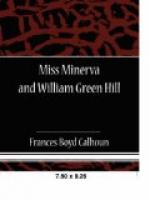“William,” she said sternly, “you must not talk so much like a negro. Instead of saying `I sho’ is hongry,’ you should say, `I am very hungry.’ Listen to me and try to speak more correctly.”
“Don’t! don’t!” she screamed as he helped himself to the meat and gravy, leaving a little brown river on her fresh white tablecloth. “Wait until I ask a blessing; then I will help you to what you want.”
Billy enjoyed his breakfast very much. “These muffins sho’ is—” he began; catching his aunt’s eye he corrected himself—”
“These muffins am very good.”
“These muffins are very good,” said Miss Minerva patiently.
“Did you ever eat any bobbycued rabbit?” he asked. “Me an’ Wilkes Booth Lincoln been eatin’ chit’lins, an’ sweet ‘taters, an’ ‘possum, an’ squirrel, an’ hoecake, an’ Brunswick stew ever sence we’s born,” was his proud announcement.
“Use your napkin,” commanded she, “and don’t fill your mouth so full.”
The little boy flooded his plate with syrup.
“These-here ‘lasses sho’ is—” he began, but instantly remembering that he must be more particular in his speech, he stammered out:
“These-here sho’ is—am—are a nice messer ’lasses. I ain’t never eat sech a good bait. They sho’ is—I aimed to say—these ‘lasses sho’ are a bird; they’s ’nother sight tastier ’n sorghum, an’ Aunt Cindy ’lows that sorghum is the very penurity of a nigger.”
She did not again correct him.
“I must be very patient,” she thought, “and go very slowly. I must not expect too much of him at first.”
After breakfast Miss Minerva, who would not keep a servant, preferring to do her own work, tied a big cook-apron around the little boy’s neck, and told him to churn while she washed the dishes. This arrangement did not suit Billy.
“Boys don’t churn,” he said sullenly, “me an’ Wilkes Booth Lincoln don’ never have to churn sence we’s born; ’omans has to churn an’ I ain’t agoing to. Major Minerva—he ain’t never churn,” he began belligerently but his relative turned an uncompromising and rather perturbed back upon him. Realizing that he was beaten, he submitted to his fate, clutched the dasher angrily, and began his weary work.
He was glad his little black friend did not witness his disgrace.
As he thought of Wilkes Booth Lincoln the big tears came into his eyes and rolled down his cheeks; he leaned way over the churn and the great glistening tears splashed right into the hole made for the dasher, and rolled into the milk.
Billy grew interested at once and laughed aloud; he puckered up his face and tried to weep again, for he wanted more tears to fall into the churn; but the tears refused to come and he couldn’t squeeze another one out of his eyes.
“Aunt Minerva,” he said mischievously, “I done ruint yo’ buttermilk.”
“What have you done?” she inquired.




